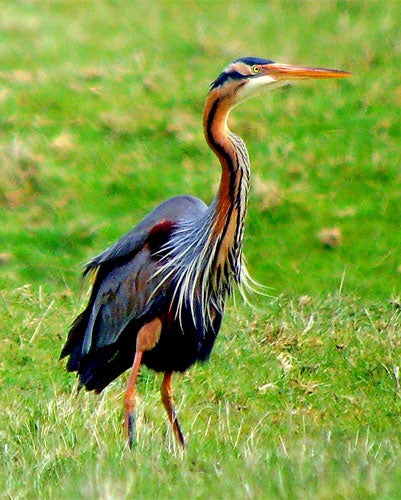European herons relocate to Kent as temperatures rise

Your support helps us to tell the story
From reproductive rights to climate change to Big Tech, The Independent is on the ground when the story is developing. Whether it's investigating the financials of Elon Musk's pro-Trump PAC or producing our latest documentary, 'The A Word', which shines a light on the American women fighting for reproductive rights, we know how important it is to parse out the facts from the messaging.
At such a critical moment in US history, we need reporters on the ground. Your donation allows us to keep sending journalists to speak to both sides of the story.
The Independent is trusted by Americans across the entire political spectrum. And unlike many other quality news outlets, we choose not to lock Americans out of our reporting and analysis with paywalls. We believe quality journalism should be available to everyone, paid for by those who can afford it.
Your support makes all the difference.Britain has a new breeding bird species – or at least, it very nearly does. A pair of purple herons have begun nesting at the Royal Society for the Protection of Birds' (RSPB) reserve at Dungeness in Kent, and are thought to be sitting on eggs.
If the eggs hatch out, it will be the first time that this strikingly colourful relative of our own grey heron has been recorded as breeding in Britain, although a pair of the birds did attempt to nest at the RSPB's flagship reserve at Minsmere in Suffolk three years ago – but the nest was washed away in the downpours of summer 2007.
Widespread in continental Europe and across Asia, purple herons migrate every autumn to spend the winter in Africa south of the Sahara. The extension of the bird's breeding range northwards to Britain may be related to the warming climate.
This is also thought to be the reason why two other handsome members of the heron family have also spread north to Britain in recent years: the little egret, which began breeding in Poole Harbour in Dorset in 1996 and is now widespread; and the cattle egret, which began breeding on the Somerset Levels in 2008. It is anticipated that purple heron numbers in Britain may now also expand.
"Purple herons are high up on the list of birds that we expect to see setting up home in southern Britain as the changing climate pushes them further north," said Dr Mark Avery, the RSPB's conservation director. "This highlights the importance of wildlife havens like Dungeness in providing space for species displaced by global warming."
The Dungeness peninsula is known for its vast shingle beach which holds the famous garden of the filmmaker Derek Jarman, but it also has lagoons and wetlands where birds such as herons can breed. The exact location of the new nest is being kept a secret, but it is being guarded against egg collectors under a round-the-clock monitoring scheme by RSPB staff, with help from Kent Police.
"At the moment there is little for visitors to see as the birds are sitting tight on the nest," Dr Avery said. "The area is a great place to visit and is teeming with spring wildlife – but please don't come hoping to see the herons as you are likely to be disappointed.
"If the eggs hatch successfully, then we hope to set up a viewing station at a safe distance away from which the public will be able to catch a glimpse of this historic wildlife moment."
Another, longer term threat to the birds may be the plan to develop an international airport at nearby Lydd, which was granted planning consent by the local Shepway District Council despite a recommendation to refuse it on environmental grounds by the council's own planning officials. The RSPB is calling on the Government to call in the application and determine it centrally.
"The potential development of an airport on the peninsular casts a large shadow over the future of this magnificent site and its wildlife," Dr Avery said.
Join our commenting forum
Join thought-provoking conversations, follow other Independent readers and see their replies
Comments